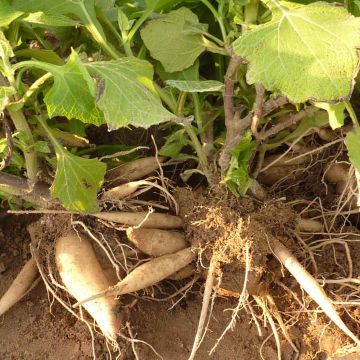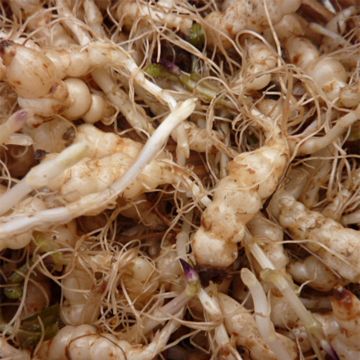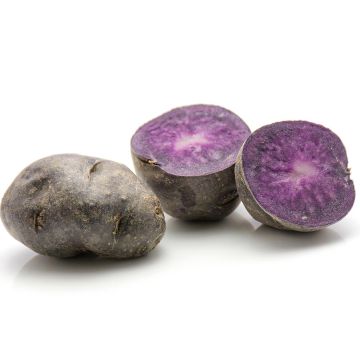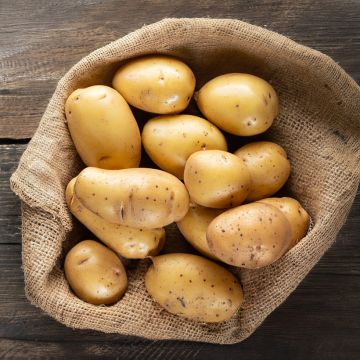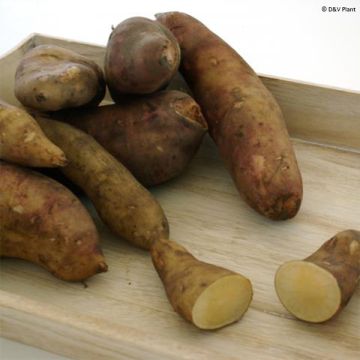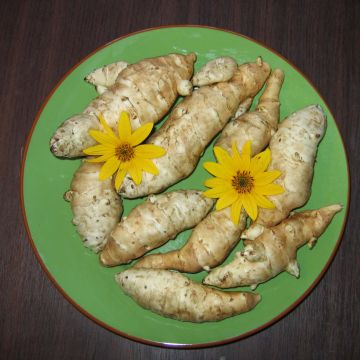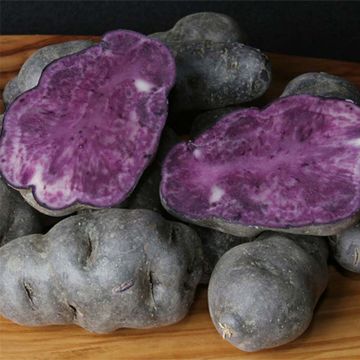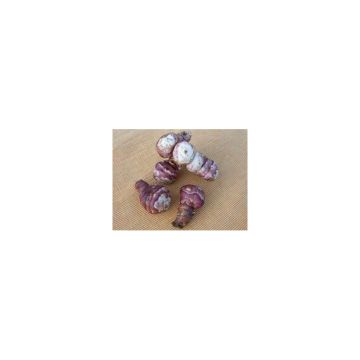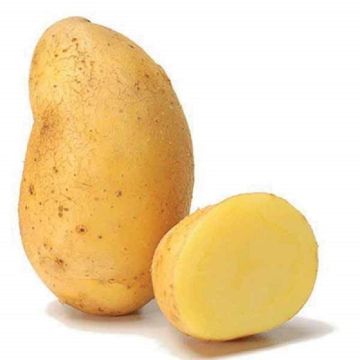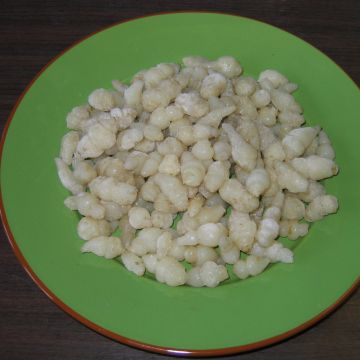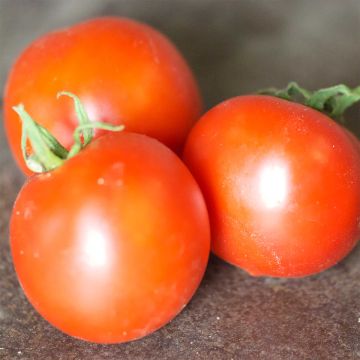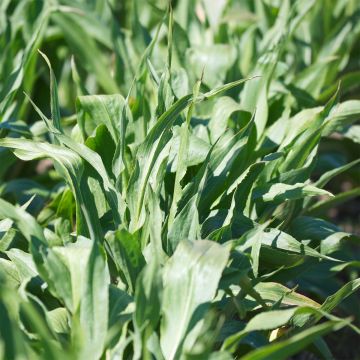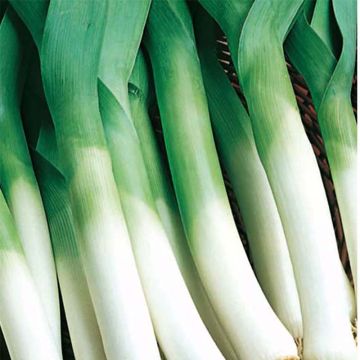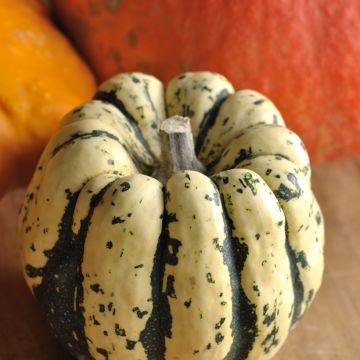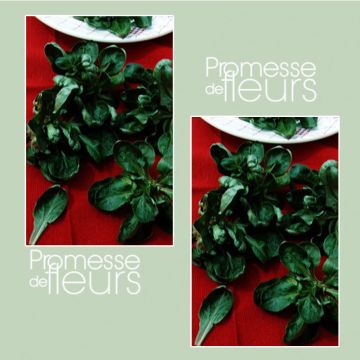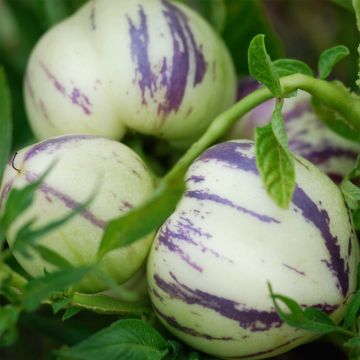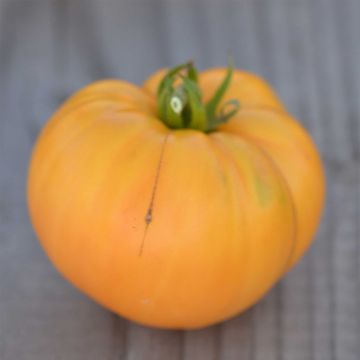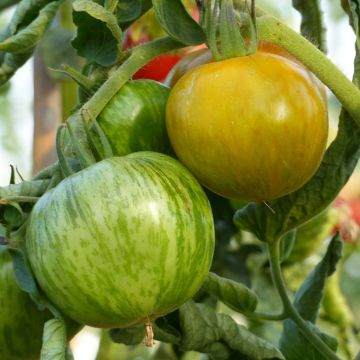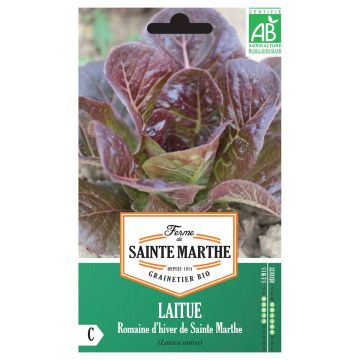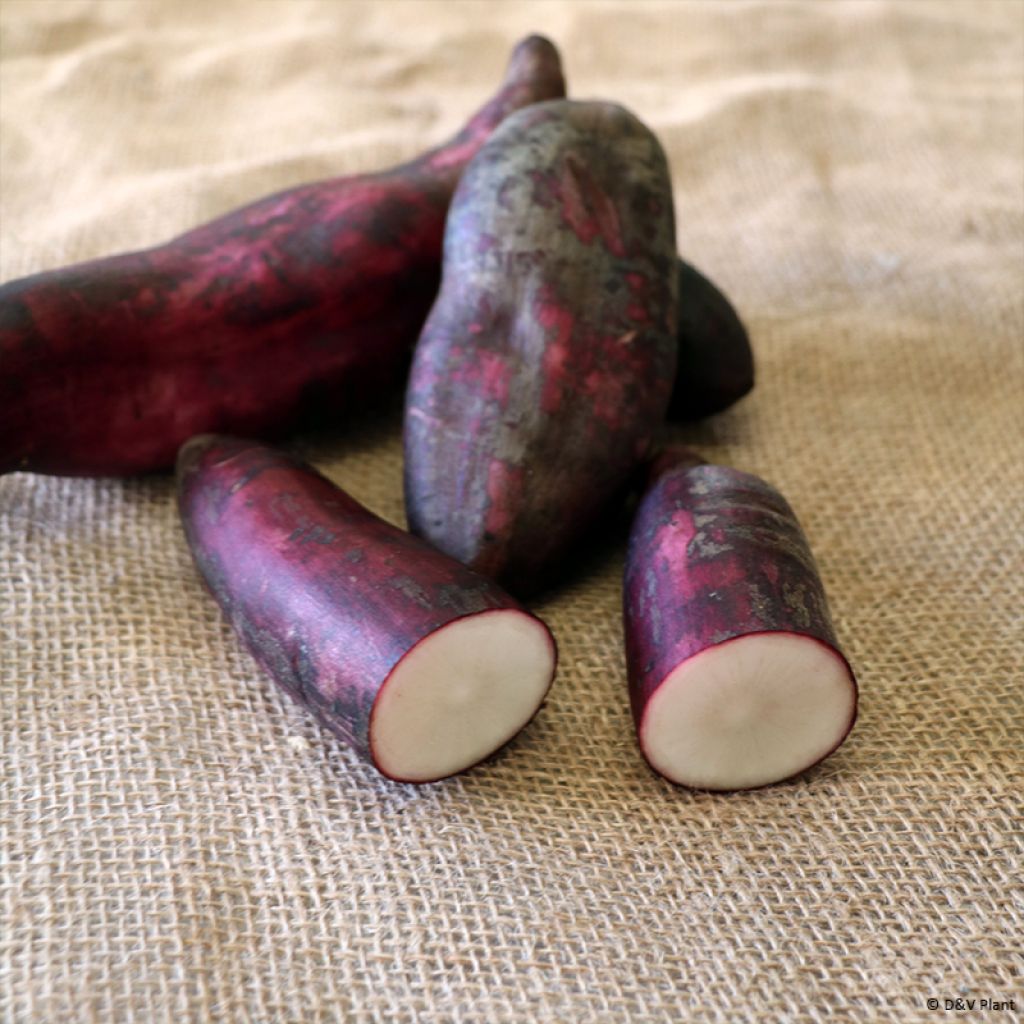

Poire de terre Morado - Smallanthus sonchifolius
Morado Earth Pear - Smallanthus sonchifolius
Smallanthus sonchifolius Morado
Yacon 'Morado'
Received the plant in good condition, very satisfied with the quality. Thank you!
Ali, 28/08/2024
This item cannot be shipped to the selected country
Delivery charge from €5.90
More information
Schedule delivery date,
and select date in basket
This plant carries a 6 months recovery warranty
More information
We guarantee the quality of our plants for a full growing cycle, and will replace at our expense any plant that fails to recover under normal climatic and planting conditions.
From €5.90 for pickup delivery and €6.90 for home delivery
Express home delivery from €8.90.

Description
Smallanthus sonchifolius 'Morado' is a resistant and productive variety of yacon that develops reddish leaves and tubers with a purplish skin. They are edible and contain a white flesh with a slightly pink hue under the skin. Its granular texture resembles that of a pear and its flavour is mildly sweet. The tubers can be consumed raw as a fruit or cooked in savoury or sweet dishes. This non-hardy perennial is grown as an annual in our climate. Plant from mid-May for a harvest in October-November.
It belongs to the Asteraceae family, like dahlias whose roots are similar. This tuberous perennial plant is native to South America. it is a non-hardy perennial that is grown as an annual in our climates. In summer, it produces yellow flower heads, which are small compared to its large triangular leaves. It needs space to grow as it can reach a height and width of 1.5m (5ft. This vigorous plant will provide shade to its neighbours.
It has a mildly sweet flavour and granular texture. It can be eaten both raw and cooked in savoury and sweet dishes. When eaten raw, it adds a crunchy texture to salads or fruit salads. It can be cooked like potatoes: boiled, steamed, sautéed, roasted in the oven, etc. In desserts, it pairs particularly well with chocolate. Like Jerusalem artichokes, it is rich in inulin and low in calories.
Harvesting: it should be harvested when the leaves wither after the first frosts, around October-November. Wait as long as possible, as the tubers form in short days. Gently lift the entire roots with a fork and harvest the tubers. Let them dry out for a few hours on the ground in dry weather. To make the flesh sweeter, it is recommended to expose the harvested tubers to the sun for a few days.
Storage: it can be stored very well for several months. Store the tubers like potatoes, in a cool and dry place, protected from light. Storage in dry sand is ideal. The tubers become slightly sweeter over time. Store the remaining roots under the same conditions if you want to multiply them by division in the following spring.
Gardener's tip: we recommend mulching the soil with successive layers of grass clippings, if possible mixed with dead leaves.
Report an error about the product description
Harvest
Plant habit
Foliage
Other Traditional, unusual, exotic vegetable tubers
Planting and care
Plant from mid-May, when the risk of frost has passed. It prefers deep, rich and moist soils. Choose a sunny location. Add well-rotted compost in the previous autumn, after loosening the soil.
Space the plants 1.5m (5ft) apart in all directions. Dig a hole (3 times the volume of the root ball), place the root ball, and cover with fine soil. Firmly press down and water to keep the soil moist.
At the beginning of cultivation, lightly mound the stems.
It can be propagated by division in spring. Cut the stump into several pieces, ensuring each piece retains at least one bud. Plant them in pots and then transplant them into the ground when the soil is sufficiently warmed up.
Cultivation
Care
Intended location
-
, onOrder confirmed
Reply from on Promesse de fleurs
Old and forgotten vegetables
Haven't found what you were looking for?
Hardiness is the lowest winter temperature a plant can endure without suffering serious damage or even dying. However, hardiness is affected by location (a sheltered area, such as a patio), protection (winter cover) and soil type (hardiness is improved by well-drained soil).

Photo Sharing Terms & Conditions
In order to encourage gardeners to interact and share their experiences, Promesse de fleurs offers various media enabling content to be uploaded onto its Site - in particular via the ‘Photo sharing’ module.
The User agrees to refrain from:
- Posting any content that is illegal, prejudicial, insulting, racist, inciteful to hatred, revisionist, contrary to public decency, that infringes on privacy or on the privacy rights of third parties, in particular the publicity rights of persons and goods, intellectual property rights, or the right to privacy.
- Submitting content on behalf of a third party;
- Impersonate the identity of a third party and/or publish any personal information about a third party;
In general, the User undertakes to refrain from any unethical behaviour.
All Content (in particular text, comments, files, images, photos, videos, creative works, etc.), which may be subject to property or intellectual property rights, image or other private rights, shall remain the property of the User, subject to the limited rights granted by the terms of the licence granted by Promesse de fleurs as stated below. Users are at liberty to publish or not to publish such Content on the Site, notably via the ‘Photo Sharing’ facility, and accept that this Content shall be made public and freely accessible, notably on the Internet.
Users further acknowledge, undertake to have ,and guarantee that they hold all necessary rights and permissions to publish such material on the Site, in particular with regard to the legislation in force pertaining to any privacy, property, intellectual property, image, or contractual rights, or rights of any other nature. By publishing such Content on the Site, Users acknowledge accepting full liability as publishers of the Content within the meaning of the law, and grant Promesse de fleurs, free of charge, an inclusive, worldwide licence for the said Content for the entire duration of its publication, including all reproduction, representation, up/downloading, displaying, performing, transmission, and storage rights.
Users also grant permission for their name to be linked to the Content and accept that this link may not always be made available.
By engaging in posting material, Users consent to their Content becoming automatically accessible on the Internet, in particular on other sites and/or blogs and/or web pages of the Promesse de fleurs site, including in particular social pages and the Promesse de fleurs catalogue.
Users may secure the removal of entrusted content free of charge by issuing a simple request via our contact form.
The flowering period indicated on our website applies to countries and regions located in USDA zone 8 (France, the United Kingdom, Ireland, the Netherlands, etc.)
It will vary according to where you live:
- In zones 9 to 10 (Italy, Spain, Greece, etc.), flowering will occur about 2 to 4 weeks earlier.
- In zones 6 to 7 (Germany, Poland, Slovenia, and lower mountainous regions), flowering will be delayed by 2 to 3 weeks.
- In zone 5 (Central Europe, Scandinavia), blooming will be delayed by 3 to 5 weeks.
In temperate climates, pruning of spring-flowering shrubs (forsythia, spireas, etc.) should be done just after flowering.
Pruning of summer-flowering shrubs (Indian Lilac, Perovskia, etc.) can be done in winter or spring.
In cold regions as well as with frost-sensitive plants, avoid pruning too early when severe frosts may still occur.
The planting period indicated on our website applies to countries and regions located in USDA zone 8 (France, United Kingdom, Ireland, Netherlands).
It will vary according to where you live:
- In Mediterranean zones (Marseille, Madrid, Milan, etc.), autumn and winter are the best planting periods.
- In continental zones (Strasbourg, Munich, Vienna, etc.), delay planting by 2 to 3 weeks in spring and bring it forward by 2 to 4 weeks in autumn.
- In mountainous regions (the Alps, Pyrenees, Carpathians, etc.), it is best to plant in late spring (May-June) or late summer (August-September).
The harvesting period indicated on our website applies to countries and regions in USDA zone 8 (France, England, Ireland, the Netherlands).
In colder areas (Scandinavia, Poland, Austria...) fruit and vegetable harvests are likely to be delayed by 3-4 weeks.
In warmer areas (Italy, Spain, Greece, etc.), harvesting will probably take place earlier, depending on weather conditions.
The sowing periods indicated on our website apply to countries and regions within USDA Zone 8 (France, UK, Ireland, Netherlands).
In colder areas (Scandinavia, Poland, Austria...), delay any outdoor sowing by 3-4 weeks, or sow under glass.
In warmer climes (Italy, Spain, Greece, etc.), bring outdoor sowing forward by a few weeks.

































